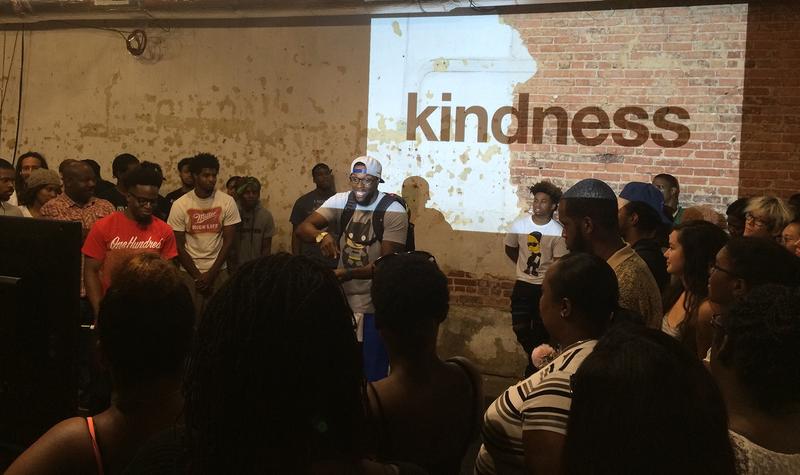Here’s a mental exercise: Try speaking in verse, out loud, off the top of your head. Be sure to rhyme, maintain a rhythm and be clever.
Sound easy?
Now do that to a beat and that is what is popularly known as freestyle. One group in Atlanta has dedicated itself to the art form not only to keep its members lyrically on their toes, but as an educational tool.
It’s called Soul Food Cypher, and each month, it hosts an open freestyle rap session called “One Hundred.” An hour before a recent event begins, a circle of men are standing on the sidewalk near the corner of Edgewood and Boulevard, outside of Space 2. This is a cypher: a circle of rappers, each taking a turn at spitting freestyle rhymes.
This month’s “One Hundred” event hasn’t even opened the doors yet, and it’s already off to a lively start.
“Our mission” explains executive director and co-founder Alexander Acosta, “is to showcase the art of freestyle and lyricism to the wider masses.”
The organization began in 2011, and if your perception of rap and hip-hop is one of flash, violence, sex, drugs and money, Soul Food stands squarely on the other side of that. Here, the cypher is a mode of self-expression rooted in a storytelling tradition that goes back to African griots.
“We have completely off-the-top freestyle lyricism,” Acosta says, “which is freestyling everything off the top of your brain. Nothing’s written down; it’s all improv right there in the moment.”
At One Hundred, there is no microphone. The guest DJ mixes beats just loud enough for everyone to hear, and everyone who steps into the cypher gets a turn. Noting that they attract a diverse, all-ages crowd, the host and the members encourage … and occasionally vocally enforce respect for everyone in the space.
After the open session, they get into games. In one called “Alphabet Aerobics,” each rapper in turn takes a letter of the alphabet to incorporate words starting with that letter into their rhymes. The linguistic dexterity involved in doing this can be baffling. Member Anthony Gary explains that the appeal of going “100 percent off the top” comes from its authenticity.
“People are good at painting a façade,” he explains on the sidewalk outside the venue, “but if they’re freestyling, they’re telling what’s real to them. You’re basically communicating what’s real, you’re projecting yourself with your words right there.”
Participants’ thoughts on this can get downright philosophical. Soul Food member Sean G likens it to Buddhism.
“You know, in Buddhist religions, they really stress living in the now, living in the moment,” he says. “I feel like freestyling is that, it’s active meditation. It’s literally you forcing your mind to now function in the moment, at that moment and create on the spot. And that right there is powerful.”
Recognizing that powerful creative energy, co-founder Mark Montgomery says that what began as a group of friends having fun soon became a means to connect with and educate youths in their community.
“Me and the co-founders, we used to get up and rap at each other’s apartments every Friday night,” Montgomery remembers. “And while we were doing it, Alex [Acosta] was actually in the process of helping out kids at the Whiteford Community Center.”
There in the Edgewood center, Acosta worked with youths ages 14 to 16. He noticed that the popular perception of young people of color in the inner-city was quite different from what he was seeing.
“The narrative was that these kids were […] ‘at-risk,’” Acosta says. “These kids, you know, they had violent pasts, they come from broken homes…”
And while he was there ostensibly to teach them photography, the real way he was able to connect with them was through their shared love of hip hop culture.
“We began doing freestyle cyphers,” Acosta says, “and in there I realized that these young men and also women were ingenious.”
Acosta describes the skill involved in freestyling as a sort of problem-solving, in that rappers are able to put their ideas into very few words and communicate those ideas, as he puts it, “in a very profound way.”
So Acosta, along with Montgomery, Majorca Murphy, Wahid Khoshravani, and Zano Bathroom, formed Soul Food Cypher as a safe and nurturing environment for MCs to congregate, as well as to provide youth mentorship through workshops and in-school programs. They’ve worked with Atlanta Neighborhood Charter Middle School and the Atlanta Symphony, to check just a couple examples.
“They don’t realize they’re improving their communication and cognitive skills,” Montgomery says, “but that’s the beauty of it. It’s something that they can just do for fun, and when it comes to actually testing them, you can see the improvement right away.”
As the crowd inside of Space 2 swells to fill the room, it’s clear that Soul Food Cypher has been community-building in its four years, and that inspires a sort of devotion in the members that you don’t see from simple open mics.
One member introduced himself as Jet, “but they call me Yeti Bravo,” he’s quick to add.
“I don’t have much of a family,” Jet says, “I’m all I got really. It’s just me — I don’t have no parents, nothing. So this is my family, when I come through, it’s like a family reunion.”
And that is the kind of comfort and familiarity that could only come from soul food.
Soul Food Cypher’s “One Hundred” freestyle events take place on the fourth Sunday of each month at Space 2 on Edgewood.







